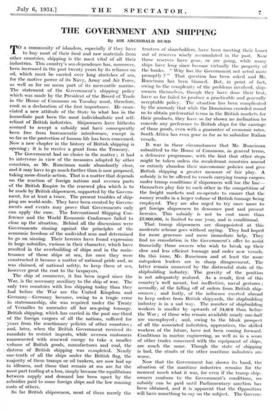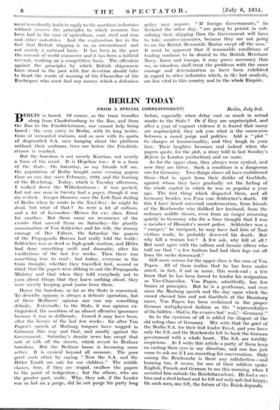THE GOVERNMENT AND SHIPPING
By SIR ARCHIBALD HURD
TO a community of islanders, especially if they have to buy most of their food and raw materials from Other countries, shipping is the most vital of all their industries. This country's sea-dependence has, moreover, been increased in the past twenty years by its reliance on oil, which must be carried over long stretches of sea, for the motive power of its Navy, Army and Air Force, as well as for no mean part of its mercantile marine. The statement of the Government's shipping policy which was made by the President of the Board of Trade in the House of Commons on Tuesday must, therefore, rank as a declaration of the first importance. He enun- ciated a new attitude of the State to what has in the immediate past been the -most individualistic and self- reliant of British industries. Shipowners have hitherto scorned to accept a subsidy and have consequently been free from bureaucratic interference, except in so far as the protection of human life has been concerned. Now a new chapter in the history of British shipping is opening ; it is to receive a grant from the Treasury.
The Government had no choice in the matter ; it had to intervene in view of the measures adopted by other countries, as Mr. Runciman made abundantly clear, and it may have to go much further than is now proposed, taking more drastic action. That is a matter that depends on the reaction of foreign nations and oversea parts of the British Empire to the renewed plea which is to be made by British shipowners, supported by the Govern- ment, for at least a truce. The present troubles of ship- ping are world-wide. They have been created by Govern- ments and events may prove that Governments only can apply the cure. The International Shipping Con- ference and the World Economic Conference failed to clear up the situation. Behind all the discussions were Governments sinning against the principles of the economic freedom of the undivided seas and determined to go on sinning. Their heresies have found expression in large subsidies, various in their character, which have resulted in the overbuilding of ships and in the main- tenance of those ships at sea, for once they were constructed it became a matter of national pride and, as was claimed, of national safety, to keep them at sea, however great the cost to the taxpayers.
The ship of commerce, it has been urged since the War, is the necessary auxiliary to the ship of war. The only two countries with less shipping today than they had before the War are the United Kingdom and Germany—Germany because, owing to a tragic error in statesmanship, she was required under the Treaty of Versailles to surrender all her sea-going tonnage. British shipping, which has carried in the past one-third of the foreign cargoes of all the nations, suffered for years from the reactionary policies of other countries ; and, later, when the -British Government received its mandate to restrict imports, while . oversea customers manoeuvred, with renewed energy to take- a smaller - Volume of British goods, manufactures and coal, the distress of British shipping • was completed. Nearly . one-tenth of all the ships under the British flag, the majority of them tramps or oil tankers, are now laid up in idleness, and those that remain at sea are for the most part trading at a loss, simply because the equilibrium - between supply and demand has been upset by the subsidies paid to some foreign ships and the low running costs of others.
So far British shipowners, most of them merely the trustees of shareholders, have been meeting their losses out of reserves wisely accumulated in the past. Now those reserves have gone, or arc going, while many- ships have long since become virtually the property of the banks. " Why has the Government not acted more promptly ? " That question has been asked and Mr.
Runciman has been blamed. But, in point of fact, owing to the complexity of the problems involved, ship- owners themselves, though they have done their best, have so far failed to produce a practicable and generally 'acceptable policy. The situation has been complicated by the anomaly that while the Dominions crowded round us to obtain preferential terms in the British markets for their products, they have so far shown no inclination to concede any preference to British ships for the carriage of those goods, even with a guarantee of economic rates. South Africa has even gone as far as to subsidize Italian vessels.
It was in these circumstances that Mr. Runciman submitted to the House of Commons, in general terms, a defensive programme, with the hint that other steps might be taken unless the recalcitrant countries amend or entirely abandon their uneconomic policies and give British shipping a greater measure of fair play. A subsidy is to be offered to vessels carrying tramp cargoes under tramp conditions if shipowners will toe the line— themselves play fair to each other in the competition of the freight markets and co-operate to ensure that the money results in a larger volume of British tonnage being employed. They arc also urged to try once more to get foreign shipowners to denounce past and present heresies. This subsidy is not to cost more. than £2,000,000, is limited to one year, and is conditional. That tramp shipowners are disappointed at this moderate scheme goes without saying. They had hoped for more generous and more immediate help. They find no consolation in the Government's offer to assist financially those owners who wish to break up their slow and less efficient tonnage and order new vessels. On this issue, Mr. Runciman and at least the more outspoken leaders are in sharp disagreement. The latter remain unmoved by the distressful state of the shipbuilding industry. The gravity of the position is not adequately realized. As a result, first of this country's well meant, but ineffective, naval gestures ; secondly, of.the falling off of orders from British ship- owners ; and lastly, of the influence exerted' abroad to keep orders from British shipyards, the shipbuilding industry is in a sad way. The number of shipbuilding workers is smaller by upwards of 54,000 than before . the War ; of those who remain available nearly one-half are unemployed; and, owing to the bleak prospect of all the associated industries, apprentices, the skilled workers of the future, have not been coming forward. Conditions in marine engineering, as well as in a score of other trades concerned with the equipment of ships, are much the same. Though the state of shipping is bad, the straits of the other maritime industries arc worse.
Now that the Government has shown its hand, the situation of the maritime industries remains for the moment .much what it was, for even if the tramp ship- owners conform to the Government's conditions, no subsidy can be paid until Parliamentary sanction has . been obtained, and it is apparent that the Opposition will have something to say on the subject. The Govern- "Tient is evidently loath to apply to the maritime industries without reserve the principles to which recourse has been had in the case of agriculture, coat, steel and iron and other industries. And the explanation lies in the fact that British shipping is on an international and not merely a national basis. It has been in the past the servant of world commerce and it has been a faithful servant, working on a competitive basis. The offenders against the principles by which British shipowners have stood in the past with fine devotion should take to heart the words of warning of the Chancellor of the Exchequer who must find any money which a defensive policy may require. " If foreign Governments," he declared the other day, " are going to persist in sub- sidizing their shipping then the Government will have to take counter-measures, because they are not going to see the British Mercantile Marine swept off the seas." It must be apparent that if reasonable conditions of trading continue to be denied to the British Merchant Navy, liners and tramps, it may prove necessary that we, as islanders, shall treat the problems with the same courage and determination as have been exhibited in regard to other industries which, in the last analysis, are less vital to this country and to the whole Empire.











































 Previous page
Previous page